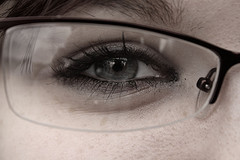To Avoid Airport Security Hassle, Don't Flinch From Eye Contact
As someone who travels red eyes coast to coast for weeks for business meetings, Jeanniey knows a thing or two about getting through security with the least friction. She tells NYT that one thing she discovered, the hard way, was that you don’t want to dodge from eye contact with the security workers.
The Israelis, famous around the world for their human behavior approach to airport security, place a big emphasis on eye contact. Instead of scanning your body with expensive and potentially invasive mega-machines, they stare into your eyes. They believe eyes are the window to the soul of the potential terrorist, and closing those windows sets off alarms.
It turns out even our much-maligned Homeland Security workers also use how you react to eye contact to identify suspicious travelers.
One time Jeanniey was flying early early in the morning from San Fran when she was called to the side for, apparently, wearing a sundress.
I heard the agent say the incident was a “407,” which I guess means long, baggy dress or something. It was really weird. Plus I didn’t really understand why I was selected. My dress didn’t come past my knees.
I was released after about 15 minutes, but during that time I did chat with the security agent. I was told that aside from my dress, one of the reasons I was pulled out for a more thorough check was that I wasn’t making eye contact with them. What can I say? It was a red-eye flight, and I was tired.
Now, I make a point of smiling and making eye contact as I go through security, no matter what time it may be. And surprisingly, I never had another issue with that suspect sundress.
So I wouldn’t go staring the workers down but when they step to you before you pass through the x-ray, make at least brief eye contact before passing through and you’ll probably avoid getting taken off to the side for the more extensive screening.
The Airport Indulgence: Bending Your Diet Rules [NYT]
Want more consumer news? Visit our parent organization, Consumer Reports, for the latest on scams, recalls, and other consumer issues.


